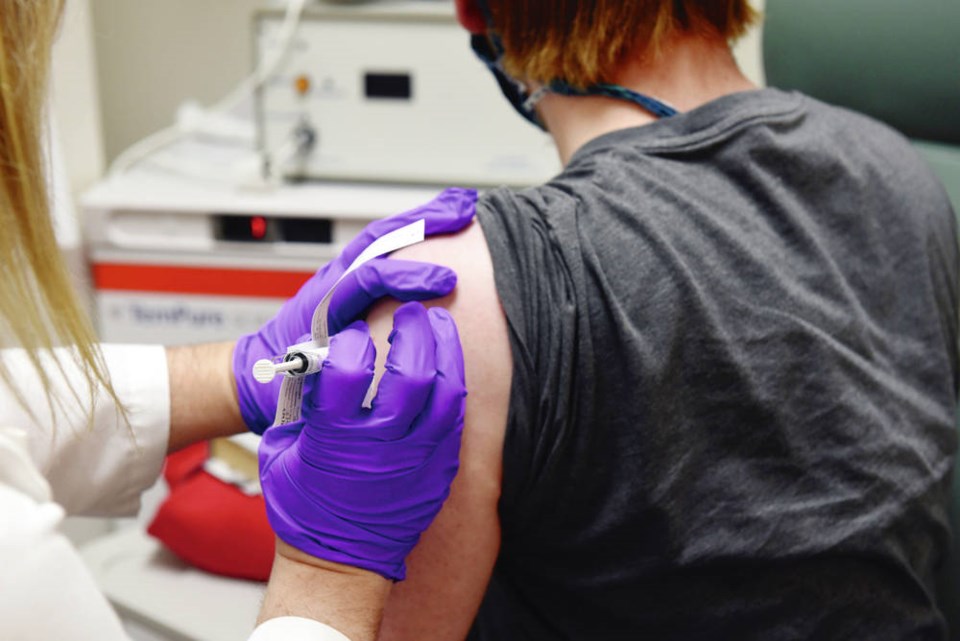Hey, remember 2019, when we all got freaked out about anti-vaxxer parents recklessly allowing their kids to spread measles in B.C.’s school system?
Good times, good times.
That seems almost quaint now, like looking back at Reefer Madness relative to today’s opioid crisis. Measles might be a menace, but it hasn’t chased us all under our beds like COVID-19.
Which made it puzzling Friday to read the results of an Angus Reid Institute survey showing that even with the coronavirus gaining speed and heft like a snowball tumbling downhill, many Canadians remain reluctant to have a COVID vaccination as soon as one becomes available.
Even the current promise of highly effective vaccines has failed to change some Canadians’ attitudes toward getting a shot. “Indeed, they are less willing to get one as soon as possible than in July, when the development and success of a vaccine was far from certain,” said the pollster in a news release headed Pfizer, Moderna and Meh.
“Two-in-five say they would get inoculated as soon as possible (40%). Close to the same number are more cautious, saying they would wait for others to go first and immunize later (36%). A consistent 15 per cent of Canadians say they will not get vaccinated, while one-in-10 (9%) are unsure. These numbers are essentially unchanged from mid-summer.”
They’re also the kind of numbers, at least at the negative end, that make epidemiologists roll their eyes and reach for the bottle. Ditto for those who saw polio cripple tens of thousands of Canadians before the miracle of the Salk vaccine arrived, and who don’t have a lot of patience for those who put more faith in internet theory than conventional science. Maybe too many people watched Will Smith in the vaccine-gone-wrong sci-fi adventure I Am Legend and too few saw Matt Damon in the reality-based Contagion.
It raises the question of how much power governments should have to make Canadians swallow the medicine it believes is good for them.
The authorities occasionally pass regulations (seatbelt and bike helmet laws, say) that attempt to save people from their own actions, but more common are rules meant to protect the innocent from the bad choices (driving drunk, firing guns in the city, letting vicious dogs run loose) of others.
When the province waded into the 2019 measles scare — about 30 British Columbians contracted the virus — the argument was that unvaccinated children could spread the disease to schoolmates who were unable to get inoculated for medical reasons.
There was also worry about vaccination levels dropping below what was needed to achieve herd immunity. The government stopped short of making measles shots mandatory, but it did force parents, as of September 2019, to divulge their children’s vaccination status. If there’s a measles outbreak, unvaccinated kids can’t go to school for three weeks.
So, if those are the lengths we’re willing to go to when faced with a measles outbreak that affected 30, how do we deal with anti-vaxxers in the case of a virus that has already infected 25,000 British Columbians and killed more than 320?
Does the government try to make coronavirus vaccines mandatory? Good luck with that. Another poll, this one released by Leger and Associates in October, found only four in 10 Canadians are in favour of the idea. Most plan to get inoculated, but many balk at being forced to do so. It smacks of Orwell.
Here’s the next question, then: Will employers have the right — or even the duty — to boot out employees who refuse a vaccine when one becomes available? You might argue that’s the logical extension of the school-measles policy.
But then, logic doesn’t necessarily play into people’s COVID response. Note that the Angus Reid survey found the lowest level of opposition to a COVID vaccine — 10 per cent — came from Atlantic Canada, the part of the country that has been most successful in keeping the virus at bay. Yet hard-hit Alberta, where you’d figure they would be keener for pandemic protection, is tied with Saskatchewan for the highest rate of opposition; 25 per cent say they wouldn’t get a shot.
Here in B.C., it’s 13 per cent, slightly lower than the national average. That flies counter to our contrarian image, particularly on and around Vancouver Island. By reputation, our edge-of-the-world paradise is a refuge for iconoclasts who, suspicious of The Man, would rather risk drowning in the ocean than swim in the mainstream.
Not this time. But how many will hustle in line for a shot?
jknox@timescolonist.com
